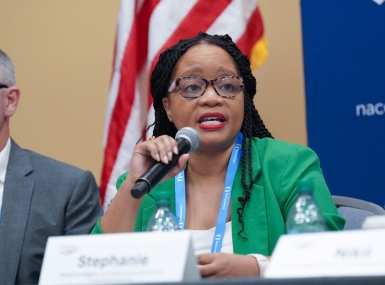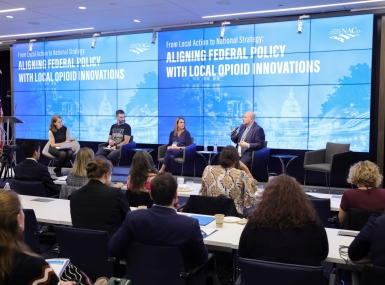LUCC members look for answers to common challenges at annual meeting in Salt Lake County

#LUCC2017 begins in Salt Lake #County, Utah
About 100 county officials and others are gathered this week in Salt Lake County, Utah to tackle some of the country’s thorniest issues — including the opioid crisis and homelessness — at NACo’s 2017 Large Urban County Caucus (LUCC) Symposium.
Wednesday’s full slate of meetings and talks from thought leaders on everything from impact investing to the organic growth of urban areas kicked off the three-day annual meeting in the mountains of Salt Lake County.
“We plan to take these innovations and strategies back to the people we serve,” LUCC Chair Larry Johnson, commissioner, DeKalb County, Georgia, said during Wednesday’s opening session.
Helping refugees and revitalizing downtown areas
Salt Lake County Mayor Ben McAdams, in his welcome remarks to county officials, offered a preview of what was to come at the confab, which will include tours Thursday of some innovations in his county.
“We’ve thrown our doors open and we’re proud of that,” he said of the county’s Spice Kitchen Incubator, one of the stops Thursday. The kitchen helps the county’s 70,000 refugees start their own culinary businesses. “It’s also added to our food diversity and our culture,” he said. McAdams also noted the success of the $119 million Eccles Theater, a public-private project completed last year also on Thursday’s tour for some county officials; it now sells out its season subscriptions and is revitalizing the downtown area.
Learning from ‘experience data’
LUCC members also heard from Ryan Smith, the co-founder and CEO of Qualtrics, the symposium’s sponsor. Offering solutions for measuring things such as customer satisfaction and employee engagement, the company “is helping folks gather a different type of data — it’s called ‘experience data,’” Smith said. Smith founded the Provo, Utah-based software firm in 2002 with his dad Scott in the basement of the family’s home; it is now worth $2.5 billion, according to Fortune.
Smith, whose company is hosting an executive leadership meeting Friday for LUCC members at his headquarters, calls counties “these silent carriers of our government that are making everything work — a lot of times on what seems like a volunteer basis, but you’re actually stewards over the future.”
Using a business model to solve social problems
A new way that counties are trying to make things work is with impact investing, a model for investments made with the intention to generate social impact along with financial return, said Jeremy Keele, president and CEO of Sorenson Impact Center at the University of Utah in Salt Lake City, which counts local governments among its clients. Keele drove home the idea that traditional philanthropic dollars “are a drop in the bucket” and while those dollars play a role that kind of funding doesn’t solve problems. “The funding gap has to be solved,” he said. “What we haven’t done a good job of is ‘What are the net results? Are we seeing long-term improvements?’ We need data systems in place.”
While Sorenson works to structure, Andi Phillips, founder and managing partner, Maycomb Capital, who was also a part of Wednesday’s LUCC panel, “works to finance.” Phillips noted that local governments are often “reinventing the wheel” when it comes to financing programs and she is seeking to create financial models that sustain programs.
“I admire what you all are doing — I admire your determination and service,” said James Lee “Jim” Sorenson, Sorenson Impact Foundation board chair. Sorenson said he is trying to build on the philanthropic model after he recognized that it’s possible to use a business model to address social problems.
Living in an increasingly urban world
While impact investing and data-driven solutions are some of the answers to counties’ problems, author and physicist Dr. Geoffrey West gave LUCC members plenty to ponder during a “big picture” luncheon address Wednesday, where he compared the synergy of urban areas to living organisms.
Learn More
“There’s a fundamental law of physics — if you use energy to create order... to create a cell, a city, a company…you must also inevitably and inextricably create disorder,” he said. “That’s called entropy.” When we think of urban areas, West said, “we think of the physicality — the roads, the skyscrapers.” In reality, urban areas are actually “the platforms in which social interaction takes place” that “facilitates wealth and ideas.”
Explosive population growth is on tap for urban areas, West noted. The pressures on the social fabric, as the world becomes increasingly urbanized, will be enormous, he warned the audience.
On Thursday, LUCC members are expected to receive an overview of opioid litigation which will be livestreamed on NACo’s Facebook page at 11 a.m. EDT, in a one-hour presentation by Teneille Ruth Brown, JD, Quinney College of Law, University of Utah; Danny Chou, assistant county counsel, Santa Clara County, California and Harriet Ryan, an investigative reporter for the Los Angeles Times.
Also on tap Thursday: LUCC members will get an overview of forecasting the economic outlook for urban counties and look at the impact of natural disasters on urban economies.
Attachments
Related News

LUCC members discuss importance of urban transit
Following low ridership during and after the COVID-19 pandemic, investing in urban county transit systems is essential, now more than ever, to cultivate thriving communities, LUCC members said.

Ongoing support is crucial for counties tackling overdose rates
The best treatment option for polysubstance use is “contingency management,” which is when someone with substance use disorder is given an incentive, such as money, for not using.

Proposed federal mandates cloud opioid treatment
Counties are positioned to quickly feel the effects of Office of National Drug Control Policy’s new priorities.
